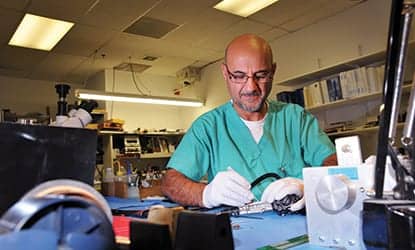According to an announcement from University of Michigan (U-M) Comprehensive Cancer Center, its prostate cancer specialists are now using the UroNav system to refine prostate cancer diagnosis and better identify those cancers that are more likely to grow quickly and spread to other parts of the body. The goal, according to the U-M team, isn’t to find every prostate cancer, but rather to identify aggressive prostate cancers that may impact a man’s survival.
“Standard prostate biopsies are random,” said Ganesh Palapattu, MD, associate professor of urology, and chief of urologic oncology at the University of Michigan Comprehensive Cancer Center. “We systematically obtain random samplings from the prostate, but there’s no guarantee that a biopsy will hit the cancer.”
Dr Palapattu compared standard prostate biopsy techniques to shooting fish in a barrel with your eyes blindfolded. The new UroNav technology that is being used by U-M utilizes the UroNav Fusion Biopsy System, and fuses pre-biopsy MR images of the prostate with ultrasound-guided biopsy images in real time, for clear delineation of the prostate and suspicious lesions, as well as clear visualization of the biopsy needle.
Developed by Invivo, the UroNav system reportedly allows urologists to know where a suspicious lesion is so a biopsy needle can be targeted more precisely. UroNav can also store the trajectory of needles so repeated biopsies can sample the same area. U-M specialists have been using a similar system for research studies for nearly 2 years. According to the team, the technology is most useful for men with a concerning prostate MRI, those considering or currently under active surveillance for prostate cancer, or any man with an elevated PSA or other concern for prostate cancer.
For more information about the UroNav system and cancer studies, visit the U-M Comprehensive Cancer Center website.




